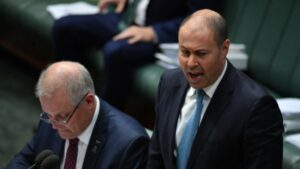Home » Commentary » Opinion » Not the budget speech
· Ideas@TheCentre

 The Treasurer’s ministerial statement to parliament this week – in place of the usual budget speech scheduled for the same day — could have been expected to shed light on three aspects of the current crisis: the economic situation and outlook; the fiscal costs and the outlook for public debt; and policies for recovery.
The Treasurer’s ministerial statement to parliament this week – in place of the usual budget speech scheduled for the same day — could have been expected to shed light on three aspects of the current crisis: the economic situation and outlook; the fiscal costs and the outlook for public debt; and policies for recovery.
On the economic situation and outlook, Frydenberg provided a litany of dismal statistics. Notwithstanding that frankness, Frydenberg’s mix of weekly costs to GDP from the Covid-19 related restrictions ($4 billion) and monthly benefits from easing those restrictions ($9.4 billion) was somewhat confusing.
If we interpolate from the information provided and simplify, he seemed to be saying that if GDP in the March quarter was 500, then in the June quarter (most of it with full restrictions) it will be about 450 and in the September quarter (with restrictions eased to create what the government calls the Covid-safe economy) it will recover to about 475.
A 5% shortfall from pre-pandemic GDP is better than a 10% shortfall, but it is still worse than any peak-to-trough decline in the 60-year history of quarterly national accounts and points to unemployment remaining very high.
This draws attention to the enduring costs of the sudden economic stop in late March and the cost of restrictions that remain in the Covid-safe economy, such as the absence of overseas travel and the ban on large gatherings. If those restrictions remain in the hope a vaccine is developed, the costs will be enormous.
Frydenberg had less to say about revised deficit and debt estimates. There will be more on this in the June statement to parliament. In the meantime, one of the most reliable non-government sources of budget estimates – Deloitte Access Economics – has estimated budget deficits totalling $359 billion across four fiscal years, most of it this year and next.
On the policies for a full recovery to erase that 5% shortfall and more, Frydenberg said many of the right things, but there were no specifics. The hard part will be translating good intentions into specific actions supported by legislation where needed. While that will be a drawn-out process, the start should come soon.
This is an edited excerpt of an opinion piece published in Spectator online as The economic statement: the real issues
Not the budget speech